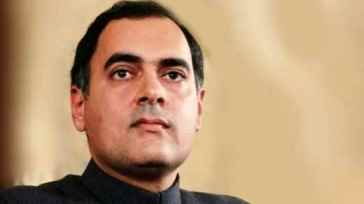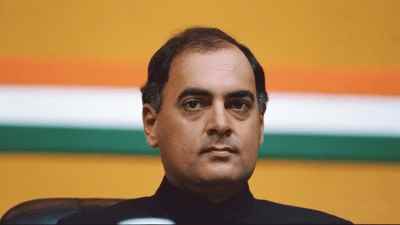Rajiv Gandhi’s tenure is marked by developments in the field of business, telecommunication industry, education system, and science and technology. Rajiv Gandhi was posthumously awarded the Bharat Ratna by the government of India in 1991.
Life of Rajiv Gandhi

Rajiv Gandhi was born in 1944 in Mumbai. He was the eldest son of Indira and Feroze Gandhi and the grandson of Jawaharlal Nehru, the first prime minister of India. He studied at the Welham Boy’s school and later at the Doon School at Dehradun.
He was a student of the Trinity College, Cambridge ad the Imperial College, London. He was a professional pilot for the Indian airlines.
Rajiv Gandhi was married to Sonia Gandhi in 1968. The couple has a son Rahul Gandhi and a daughter Priyanka Gandhi. Rajiv Gandhi was assassinated on May 21 1991.
Political Career of Rajiv Gandhi
Rajiv Gandhi had earlier no interest in politics. He entered politics after the death of his brother Sanjay Gandhi in 1980. He fought his first election from Amethi Lok Sabha seat. He was elected to Sanjay Gandhi’s Lok Sabha constituency of Amethi in 1981.He was an important political advisor of his mother. He later became the president of the Youth congress, the youth wing of the Congress party. He took office of the prime minister after his mother’s assassination on October 31, 1984. He was in West Bengal when his mother was assassinated.
His mother’s death was followed by the anti-Sikh riots. Commenting on the anti Sikh riots he said, “When a giant tree falls, the earth below shakes.” This statement by Gandhi invited criticism.
The Congress was led to a major election victory by Rajiv Gandhi in 1984. The congress party won 411 seats out of 542, the largest majority ever seen in the Indian parliament.
During his tenure as the prime Minister of India he made many developments. He dismantled the license raj, allowing business and individuals to purchase capitals, consumer goods, and import without bureaucratic restrictions.
During his tenure as the prime Minister of India he made many developments. He dismantled the license raj, allowing business and individuals to purchase capitals, consumer goods, and import without bureaucratic restrictions.
He modernized telecommunication industry, the education system, expanded science and technology initiatives; he reduced import quotas, taxes and tariffs on technology-based industries. and improved relations with the United States.

He announced a National Policy on Education in 1986 to modernize and expand higher education in India. The Jawahar Navodaya Vidyalaya system was founded by him in 1986. His efforts created MTNL in 1986. The PCOs helped spread telephone in the rural areas.
Rajiv Gandhi’s’ “Mr Clean” status was shattered by the Bofors scandal. Bofors scandal involved tens of millions of dollars and alleged payoffs by the Swedish Bofors arms company through Italian businessman Ottavio Quattrocchi in return for Indian contracts.
In 1988 Rajiv reversed the coup in Maldives antagonizing the militant Tamil outfit such as PLOTE. He sent the Indian peace Keeping Force to Sri Lanka in 1987. This led to open conflict with the LTTE.
In the 1990s it was alleged that Rajiv Gandhi held 2.5 billion Swiss Francs in secret accounts in Switzerland. The issue was raised in the Parliament. His name was however expunged from the proceedings. In 1992 the Times of India and the Hindu newspapers published reports alleging that Gandhi received funds from the KGB.
Rajiv Gandhi was assassinated while campaigning for Sriperumbudur Lok Sabha congress candidate. The assassination was carried out by the Liberation of Tigers of Tamil Eelam. A woman named Thenmuli Rajaratnam approached him in a public meeting and detonated explosives.
Rajiv Gandhi was assassinated while campaigning for Sriperumbudur Lok Sabha congress candidate. The assassination was carried out by the Liberation of Tigers of Tamil Eelam. A woman named Thenmuli Rajaratnam approached him in a public meeting and detonated explosives.
The Rajiv Gandhi memorial was built at the site. It remains one of the major tourist attractions of the place.
The Supreme Court judgment by Judge Thomas confirmed that the killing was carried out due to personal differences of the LTTE chief Prabhakaran towards Gandhi due to the latter’s sending of the Indian peace Keeping Force to Sri Lanka and the alleged IPKF atrocities against Sri Lankan Tamils. A memorial.
Awards and Honours of Rajiv Gandhi

Rajiv Gandhi was posthumously awarded the Bharat Ratna by the government of India in 1991. The “Veer Bhumi” was constructed at the spot of his cremation in New Delhi.
Awards and Honours of Rajiv Gandhi

In 1992 the Rajiv Gandhi National Sadbhavna Award was instituted by All India Congress Committee of the Indian National Congress party. The international airport at Hyderabad is named as Rajiv Gandhi International Airport after him.




